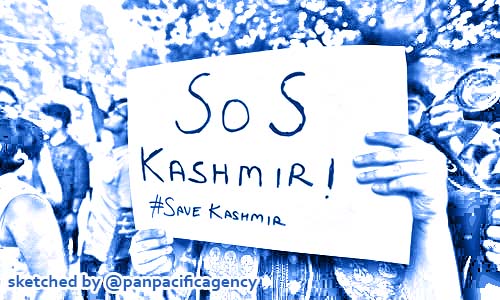[Analytics] Kashmir issue proves India unqualified for UN Security Council seat

Indian protesters go against the proposed bifurcation of the state of Jammu and Kashmir on August 5 in New Delhi, India. Photo: IC. Sketched by the Pan Pacific Agency.
Through a presidential order, the Indian government on August 5 scrapped Article 370 of Indian Constitution, which granted special status to the India-controlled Kashmir. The move means the region, an internationally recognized disputed territory between India and Pakistan, was forcibly transformed into alleged Indian territory by New Delhi. This is unacceptable to Pakistan and has triggered a serious confrontation between the two countries. Liu Zongyi specially for the Global Times.
India also “proposed to reorganize Jammu and Kashmir, carving out two separate union territories of Ladakh and Jammu and Kashmir,” reported Hindustan Times on August 5. Ladakh will be ruled directly by the central government. As the decision involves Chinese territory in the western sector of the China-India boundary occupied by India, it would definitely affect the stability of bilateral relations.
Indian Prime Minister Narendra Modi wants to build a strong Hindu state. The Bharatiya Janata Party (BJP) led by Modi had long planned to cancel the special status of India-controlled Kashmir. The fundamental purpose is to tighten control over the Muslim-majority region, change its demographic structure and fully integrate it with the rest of India. The move by the Modi government to end the special status of disputed Kashmir now can be explored from both internal and external perspectives.
Internally, Modi has to fulfill his campaign promise to strengthen control over the region. Special treatment for India-controlled Kashmir granted by the constitution forbids Indians outside the state from permanently settling, buying land, securing education scholarships and holding local government jobs in the region. The region is fraught with anti-India forces, providing a hotbed for international terrorists.
The BJP is dissatisfied with the dominant position of Muslims in the state of Jammu and Kashmir, believing the constitution has impeded the integration of the state into the country. The BJP promised in its 2019 election manifesto that there would be no special status for Jammu and Kashmir. The party gained an overwhelming victory in the 2019 general elections, which means other parties are unable to prevent the ruling party’s policy implementation.
India’s lackluster economic development is also one of the reasons for India’s Kashmir move. India is diverting domestic criticism away from the economy.
Externally, talks between the US and Taliban have reportedly progressed well. Pakistan has played an important role in the peace negotiations between the US and Taliban in Afghanistan. As relations between Islamabad and Washington thaw, US President Donald Trump even offered to solve the Kashmir issue during his meeting with Pakistan Prime Minister Imran Khan, which annoyed New Delhi.
India now has been marginalized in the Afghanistan peace process. If Pakistan helps solve the Afghanistan problem and the Taliban gains an important position in the Afghan government, India’s interest in Afghanistan will be seriously damaged. Victory for the Taliban will inspire anti-India forces in the Kashmir region.
The unilateral Kashmir move by the Modi government will have a great impact on India’s domestic politics, international politics and regional situation.
To begin with, the Modi government’s action will exacerbate domestic political division and increase the risks of turmoil in India-controlled Kashmir in the short and medium term. The revocation of the special status of Ladakh and Jammu and Kashmir was not in conformity with the procedures stipulated by India’s constitution and violated democratic principles. It drew criticism from other parties, deepening India’s political divisions. The Modi government put prominent politicians in the India-controlled Kashmir region under house arrest. This may lead to the emergence of local nationalism and radicalism, triggering long-term turmoil.
Kashmir is a UN-recognized disputed region. India’s move has exposed the Hindu nationalists’ contempt for international law and the UN as well as the dictatorial tendencies of the Modi government. It also jeopardized relations with Pakistan and China and tarnished India’s international image as the world’s largest democracy.
Pakistan has bore the brunt of India’s action. Given the gap in national strength between the two countries and its worsening economy, Pakistan is unable to provoke a direct military conflict or war with India without the support of external powers. But it will continue to support Kashmir’s anti-India armed forces to launch attacks on the Indian military.
Turning India-controlled Kashmir into two union territories also damaged China’s territorial sovereignty. China must guard against India taking advantage of improving bilateral relations to infringe on China’s territorial sovereignty. Before former prime minister Rajiv Gandhi’s visit to China in 1988, India declared China’s South Tibet to be its state of Arunachal Pradesh. Such a situation must not be repeated.
India has long hoped to become a permanent member of the UN Security Council. But it has arbitrarily violated the UN Security Council resolutions and trampled on the authority of the international organization. It’s unqualified for a permanent seat in the UN Security Council.
The author is a senior fellow of Shanghai Institutes for International Studies, a visiting fellow of the Chongyang Institute for Financial Studies, Renmin University of China and a distinguished fellow of the China (Kunming) South Asia & Southeast Asia Institute.